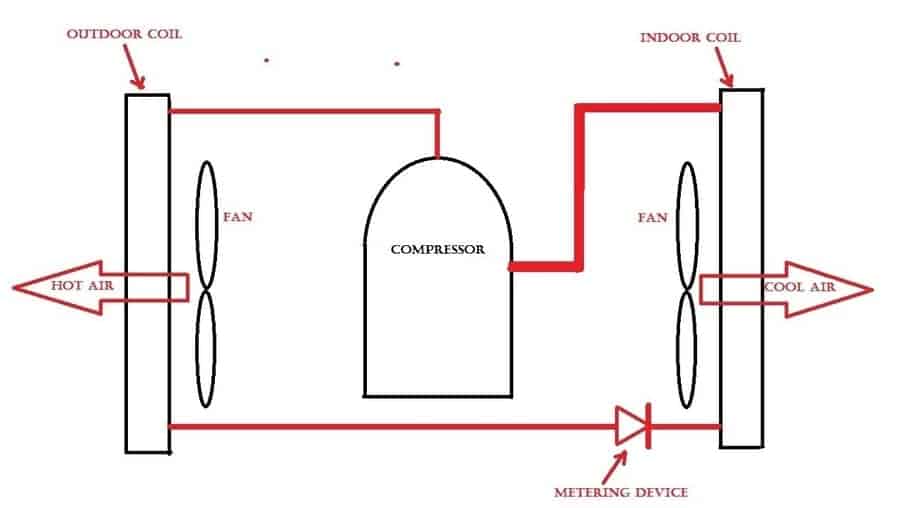Heat pumps leak water in winter because they have a defrost cycle governed by a control board. When outdoor temperatures drop toward freezing and below, the control board will call for defrost when certain conditions are met to reverse the unit into the cooling mode, heating the outdoor coil and melting frost or ice of the coil.
The melting frost or ice is the water you see under your heat pump’s outdoor unit.
It would be concerning if you never saw water dripping under your heat pump. The amount of water or ice accumulation is closely related to the outdoor temperature and humidity. The lower the outdoor temperature and the higher the humidity, the more water you should see.
Think about a window air conditioner. Cold air blowing inside. Have you ever walked by a widow unit on the outside and felt the hot air? Imagine turning that window unit around and blowing the hot air inside the house. You have just created, in your mind, a simple heat pump.
But a problem just came up. When you want that heat in your home, it’s going to be cold outside, and the temperature of the air going over the cold coil, which is now outside, is getting much colder because of the outside air temperatures.
When the outdoor ambient drops near freezing and below, the coil will begin to freeze over, and the airflow through the coil will be restricted.
Somehow, we need to defrost that ice. That’s where the water comes from under your heat pump in the winter.
Should My Outdoor AC Unit Be Leaking Water?
About 8 out of 10 of my customers don’t understand the difference between a heat pump and an air conditioning unit. By looking at the outside, you can’t tell the difference.
Only one slight difference exists between a heat pump and a cooling-only unit. Where the copper lines attach to the unit, there is a third port for the technician to attach his gauges. But, peering down inside, past the motor and fan blade, a heat pump includes much more piping and valves.

Should My Window AC Unit Leak Water Outside?
This is a great question. The answer will help you understand why your heat pump outdoor unit leaks water. Whole house heat pumps, air conditioners or central HVAC systems, and window units have indoor and outdoor coils.

These two refrigeration coils have fans that move air through the coils. The indoor coil picks up the heat in the house, and the outdoor coil dissipates that heat to the outside.
The compressor pumps hot, high-pressure refrigerant (Freon) into the outdoor coil against a metering device where the fan blows over the coil to move the heat to the out-of-doors.
Most window units are designed to cool a room. When inside air is circulated through the indoor coil, the coil picks up the heat in the room and transfers this heat to the outdoor coil through the refrigerant medium or what most people call Freon (a brand name).
That’s why you feel the much hotter air outside.
But because the inside of your home is above freezing, the indoor coil doesn’t freeze up like a heat pump outdoor coil in the winter. Instead, it will create condensation.
That condensation is drained through tubing or channels along the bottom of the window unit to the outside. Hence, there is a constant drip from the unit onto your flower bed or whatever is under the unit.
Are You Asking How To Fix A Leaking Heat Pump?
Now you know an outdoor heat pump unit leaking water outside is a natural event. But questions have to be specific. When your heat pump is mainly in the cooling mode in the summer, is it leaking inside?
You need to fix a condensation leak at the indoor air handler or furnace. Specifically, the indoor coil drain pan and line leading to either a condensation pump or drain line somehow removes that condensation from your house.
Depending on your level of maintenance and the expertise of the technicians working on your equipment, several things could be causing the leak.
- The drain line could be plugged.
- The coil pan rusted out or cracked.
- Low on refrigerant.
- Coil dirty or plugged.
- Filter too small or dirty.
- Not enough airflow.
Drain pans under indoor coils tend to get dirty and fill with grime and mold. This debris collects in the pan and can plug the drain hole. Indoor coils can freeze up in the summer just like heat pump outdoor coils can freeze up in the winter.
This coil froze because the homeowner turned his thermostat to cool, set the temperature below 70 degrees on a warm spring day, and then left it running all night when the outdoor temperature dropped. The air filter was also quite dirty, limiting the amount of airflow through the coil.

A Pool Heat Pump Leaking Water Can Be A Different Problem
Although a pool heat pump has many of the same parts as a residential air-to-air heat pump, it has a different type of coil or heat exchanger to heat the pool water. Instead of a coil with a fan, it’s a coil with water to pick up the heat from the heat pump.
This heat exchanger can be a chamber within a chamber, one with refrigerant and the other with water.
Do a Google image search for pool heat exchangers and get a look at the types of coils that perform this function.
You have another leak source because you would now have another coil with water.
Separating now what you’ve learned about other water leaking scenarios, a heat pump leaking water outside the unit in the winter is proper for its operation. Again, it depends on temperature and humidity.
Heat pumps should be raised up off the pad to allow for drainage. The bottom pan in the outside heat pump unit has drain holes that need to be kept clear for proper drainage.
Conclusion
Heat pumps and air conditioners are different because of the functions they provide. Heat pumps heat and cool, and an AC unit only cools.
Having a puddle of water under a heat pump in the winter is a good thing as long as the heat pump is raised off the pad to allow for drainage.
When a heat pump is flat on the pad and drainage is limited, ice can form around the bottom of the unit, causing damage to the coil. Ice forming around the aluminum fins and copper tubing has a crushing effect that destroys the coil.
Keep your unit maintained properly with checkups from a qualified service company.

